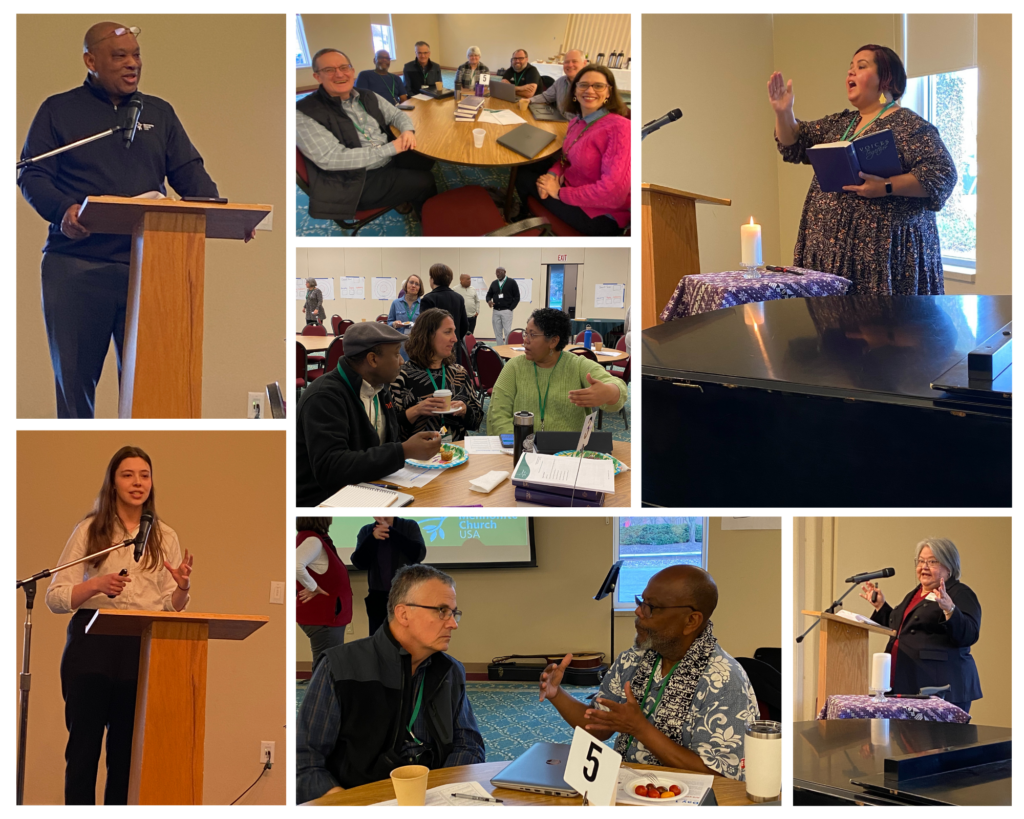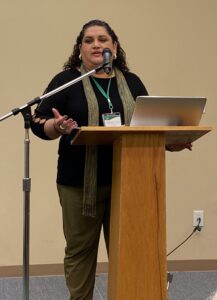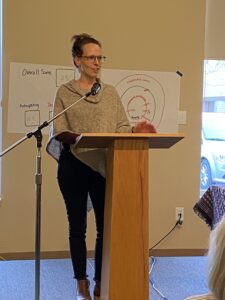 The MC USA Constituency Leaders Council (CLC) reflected on the question, “What does it mean to do church together?” at its biannual meeting at College Mennonite Church, Goshen, Indiana, on March 21-23, 2024. Moderator-elect Marty Lehman presided over the meeting, which introduced leaders to MC USA’s new strategic plan, invited them to participate in reinvention exercises, and offered inspiration through storytelling.
The MC USA Constituency Leaders Council (CLC) reflected on the question, “What does it mean to do church together?” at its biannual meeting at College Mennonite Church, Goshen, Indiana, on March 21-23, 2024. Moderator-elect Marty Lehman presided over the meeting, which introduced leaders to MC USA’s new strategic plan, invited them to participate in reinvention exercises, and offered inspiration through storytelling.
Fifty-eight leaders, representing area conferences, racial/ethnic groups, constituency groups and MC USA Administration, attended the meeting.
Strategic Plan
MC USA Executive Director Glen Guyton (collage, top left) reported on the activities of the administrative staff and presented the new denominational strategic plan, which seeks to reimagine church.
Objectives of the plan include identifying and leaning into the key markers and practices of the Anabaptist faith community, communicating in new ways and through new channels, providing prophetic leadership in peace and justice, developing a streamlined and effective denominational structure, and creating a sustainable funding system.
Reinvention Lab
MC USA Associate Executive Director Iris de León-Hartshorn (collage, bottom right) led attendees through a workshop to reimagine church using Reinvention Academy tools. MC USA designed the workshop to help leaders analyze how adaptive they and their organizations are to anticipating, designing and implementing change. Common fears among attendees included fear of conflict/polarization, fragmentation, loss of identity, loss of resources, and change. In considering how they might address these concerns, many participants recognized that they have considerable influence over their fears.
“It’s one thing to name the fears. It’s another thing to say, ‘What are the outcomes or potential outcomes of living into those fears as opposed to addressing them?’” said Doug Luginbill, conference minister, Central District Conference. He said he found the reinvention exercises helpful, especially in recognizing the difference between what we can change and what we need to let go.
Storytelling
Faith formation through storytelling was a key component of the meeting.
On day one of the meeting, MC USA Archives Coordinator Olivia Krall (collage, bottom left) inspired leaders with the story and photos of Nellie Miller Mann, a brave, young Mennonite relief worker and Goshen College graduate, who supported refugees fleeing the Armenian genocide in the early 1920s.
“One of the reasons why this [story] is so important is that it speaks not just to our Mennonite ideas of peace and justice work, but also because it speaks on a broader international scale,” said Krall. “The Armenian Genocide is extremely controversial to this day. There are several nations who have actively suppressed information surrounding it. And it’s collections like these that provide vital evidence for the experiences and lives of people who experienced extreme tragedy and conflict like this,” she explained.
Krall also emphasized the significance of preserving church records for historical research, genealogy and disciplinary cases, as well as personnel files and property records.
CLC worship leaders Joanne Gallardo (collage, top right), Nathan Luitjens and Randy Spaulding also incorporated storytelling into opening worship each day, inviting selected CLC members to share about what keeps them in church.

Sandra Montes-Martinez
One of the worship speakers, Sandra Montes-Martinez, associate conference minister for Western District Conference, reflected that her calling to serve keeps her energized.
She said, “We recognize now, as a denomination, that we are not monolithic. We come from different cultures, backgrounds. We have different theologies, perspectives, and we are in different places in our spiritual journeys. But we choose to believe that diversity is now our strength … Let us embrace our diversity as a gift from God and let us work together to build a more just and peaceful world for all of us.”
Other worship speakers were Emmanuel Mwaipopo, board member for Mosaic Mennonite Conference (Read his reflection here), and Karla Morton, moderator of Pacific Northwest Mennonite Conference.
In addition, three guest speakers addressed youth and young adult faith formation:
- Talashia Keim Yoder, pastor of College Mennonite Church and author of Building Faith resources and Mennonite Education Agency’s “Advent/Lent At Home” guides, emphasized the importance of equipping families to reinforce at home what they are doing in church on Sunday, even modeling spiritual practices and activities for them.
-

Jenna Liechty Martin
Jenna Liechty Martin, executive director of Camp Friedenswald, talked about faith formation at camp and how it provides young people with “a unique opportunity that opens space for a different way of being and helps them see the Divine in their lives without the constant preoccupation with technology.”
- Rebecca Stoltzfus, president of Goshen College, addressed the importance and changing role of higher education, noting that in past decades, Mennonite colleges were seen as a way to protect Mennonite youth from the world. Today, she said, Goshen College is “a place where Mennonite and other youth are introduced to the world through an ethos of Christian faith, service and peace.”
On the final day of the meeting, Lehman invited three Goshen area ministries to share stories about how God is working in their communities.
- Kay Bontrager-Singer, pastor of Faith Mennonite Church, described how her small congregation purchased a hospitality house to provide safe and affordable short-term housing for neighbors in need.
- Phil Waite, pastoral team leader at College Mennonite Church, shared about how his congregation is engaging with the local community, including partnering with Everence to walk alongside a local immigrant family as they purchased a home.
- Luke Gascho, executive director emeritus of Merry Lea Environmental Learning Centerof Goshen College and member of Waterford Mennonite Church, spoke about how the Waterford congregation, as part of its faith practice, tends and shares 84 acres of the church’s property, located on the ancestral homeland of the Potawatomi and Miami people.
In other business
- Marco Güete, director of Hispanic Ministries for Mennonite Education Agency, shared about the growth and expansion of the various degree, graduate certificate and continuing educational programs offered in Spanish by Hispanic Ministries to train people for ministry within the church.
- Stan Shantz provided an update on the work of the MC USA Leadership Discernment Committee, which identifies potential candidates for the Executive Board and other agency boards. “During this past biennium, with [one] exception, all conferences have representation on at least one agency board, just under 50% of our board members are women and over 40% are BIPOC,” he said. Shantz encouraged the leaders to continue to nominate board candidates.
The next CLC meeting is Saturday, Oct. 12, 2024, via Zoom.
Mennonite Church USA is an Anabaptist Christian denomination, founded in 2002 by the merger of the Mennonite Church and the General Conference Mennonite Church. Members of this historic peace church seek to follow Jesus by rejecting violence and resisting injustice. MC USA’s Renewed Commitments state the following shared commitments among its diverse body of believers: to follow Jesus, witness to God’s peace and experience the transformation of the Holy Spirit. Mennoniteusa.org
Written by Camille Dager.

